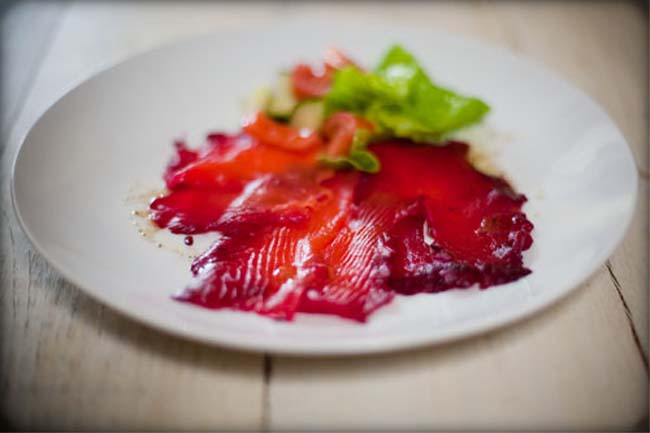
The restaurant opened in 2005, in a brick-walled storefront dressed up with vintage couches and a big white chandelier. Carpenter, whose own heritage is Korean American, pulled in a few dishes from Scandinavia, too. "It's just a region that, culinarily, I've been interested in," she says.
At Domku Bar and Café, though, it's easy enough to sate a craving for dishes inspired by northern Europe-like Poland, where chef/owner Kera Carpenter spent three years in the Peace Corps-and some from the Caucusus and the Balkans, where she later worked at an NGO
Slavs to Fashion: Domku and Slaviya Do Eastern Europe, One Country at a Time
Posted by Mike Madden on Dec. 8, 2010 at 6:08 pm
Master Lox: Domku Cures its Salmon In House
Photo by Darrow Montgomery
[Excerpt]
As remedies for cold weather go, it's hard to top a shot of slijvovice and a heap of salty fish.
Or at least, that was the conclusion I came to last weekend, sitting at a table near the bar at Domku Bar and Café sipping on the plum brandy and smearing a pâté of smoked salt herring on crusty bread. It was the first really frigid night since Snowpocalypse melted away last March, but the nearly six-year-old Petworth restaurant was doing a good job keeping me warm. A pile of thinly sliced gravlax, salmon cured with beets and Svedka vodka, sat on one plate. Another pâté of smoked salmon joined the herring, with a chicken liver mousse rounding out a trio. I'd lost the battle to order the fried pickled herring appetizer, which none of the three people with me seemed particularly taken by. But the potato, carrot, and onion latkes we ordered came with a healthy measure of salmon roe piled on top.
To listen to the TV commercials, December is mostly about Christmas sales and next year's car models. But the first cold snap of the season also coincided with the first few nights of Hanukkah, which provided as good a reason as any to head off in search of Slavic comfort foods. Sure, a Jewish deli is a treasure in any season. When the daytime high temperatures struggle to break freezing, though, the thoughts-and stomachs-of nice Jewish boys stray a bit farther back in time and across the Atlantic.
Fortunately, Eastern European food and traditional Jewish food are often pretty similar: The Polish, Ukrainian, Lithuanian, and Russian shtetls where the latter came from were often just down the road from the villages where the former was being cooked up. In the District, which never saw massive waves of Eastern European immigration, there isn't a huge supply of any of these cuisines.
At Domku, though, it's easy enough to sate a craving for dishes inspired by northern Europe-like Poland, where chef/owner Kera Carpenter spent three years in the Peace Corps-and some from the Caucusus and the Balkans, where she later worked at an NGO. The restaurant opened in 2005, in a brick-walled storefront dressed up with vintage couches and a big white chandelier. Carpenter, whose own heritage is Korean American, pulled in a few dishes from Scandinavia, too. "It's just a region that, culinarily, I've been interested in," she says.
The gravlax is cured in-house, a side of salmon at a time. ("We don't have the space" to do any of the other pickling or smoking of menu items, Carpenter says.) It takes anywhere from a few days to a week, Carpenter says. Domku brines the fish using a "very traditional" Swedish recipe, with a mixture of salt, sugar, fresh dill, and freshly grated beets. The mix sits on top of the salmon for a few days; Carpenter pours vodka all over the whole thing, then slices the salmon as thinly as possible before serving. The beet juice gives the fish a dramatic crimson tint. On the plate, it's doused liberally with olive oil, lemon juice, and more fresh dill. The dish is fishy enough that you know what you're tasting, but the salt and the lemon keep it bright. On our last visit, while my friends talked, I quietly grabbed the last piece of salmon from under a garnish and ate it before they noticed it.
The fish pâtés don't take quite as much in-house preparation. Carpenter gets the smoked salt herring from a fish vendor. But the herring comes in looking like a salt cod, she says; it's washed down in milk to rehydrate it before it's whipped with cream cheese into a paste that's "better than it sounds," she laughs. It tasted like a mild whitefish salad.
Domku's latkes, made from carrots, sweet potatoes, potatoes, and onions, are topped with fresh sour cream and salty salmon roe, which helped cut through the cream. They don't only do fish. Though there wasn't much room left on our table for appetizers, we had some garlicky Brussels sprouts with pine nuts, too; they weren't quite as caramelized as they could have been, but they weren't bad. The goulash had a faint spiciness, and the meat was tender, giving off juices that melted into the mashed potatoes underneath.
In all, what might have been a debilitatingly heavy meal in August was good fuel for the walk home on a cold night in December: Pierogies were filled with a creamy mixture of bacon, onion, potato, and twarog, a Polish cheese; the dough was a little chewy, but the filling was hearty. (Yes, bacon-just because I like smoked fish doesn't mean I keep kosher.) Swedish meatballs-also served atop the same rich mashed potatoes in the goulash-were slightly sweet, thanks to the pork used to make them. A Polish bigos warsawski, or hunter's stew, mixed kielbasa and pork with mild sauerkraut and fresh cabbage and carrots. A friend visiting from Chicago pronounced it better than the one he gets back home. I washed it all down with more slijvovice-served with a single ice cube to dull its bite a bit. (Domku also has a long menu of cocktails made with other Baltic or Balkan liquors, like absinthe and a variety of aquavits, as well as beers from around Eastern Europe.)
Domku, 821 Upshur Street NW, (202) 722-7475
Eatery tips? Food pursuits? Send suggestions to hungry@washingtoncitypaper.com.















